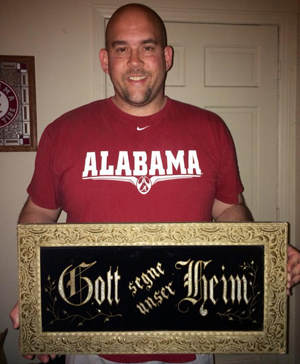
Keith Stringfellow
When Keith Stringfellow was about 12, he was reading a book about World War II when his great uncle, a World War II veteran, began telling him about his experiences at Normandy after D-Day. Stringfellow asked him what affected him most during the war, and he answered simply, “Dachau.”
The incident and subsequent discoveries Stringfellow made about the Holocaust and his great uncle’s role in the liberation of the Dachau concentration camp sparked a lifelong passion for learning about why the Holocaust happened. Now, as a history teacher at Charlotte Islamic Academy in Charlotte, NC, Stringfellow has the opportunity to attend the commemoration of the 70th anniversary of the liberation of Auschwitz on USC Shoah Foundation and Discovery Education’s Auschwitz: The Past is Present professional development program.
Educators from 11 different countries representing four continents will attend a four-day workshop designed to deepen their understanding of the historical landscape of Poland before, during and after the Holocaust and increase participant knowledge of authentic sites including Auschwitz-Birkenau.
Stringfellow said being chosen to go on the trip was an honor, and it signals that he is being entrusted with carrying on the lessons of the Holocaust. As one of the last people to be able to interact with survivors face to face, it will be his duty to make sure they are not forgotten.
“When the survivors have all passed on I will be one of the voices that can carry on their memories, sacrifices, and examples of perseverance so that future generations can know that I am a witness and advocate for [the survivors] to the coming generations,” Stringfellow said.
He wants his students to learn that, as his grandmother used to say, “Silence is tacit consent.” Remaining silent can allow a small minority of hateful people to slowly take over until it is too late – just like the events that led to the Holocaust.
“It is important for students to understand that what happened then was not a spontaneous act. It was a gradual move from prejudice to persecution, dehumanization, and finally mass murder of an entire group of people,” he said. “The lessons of that past must be studied and applied to today in a world where mass media, entertainment, and the fast paced lives of the modern world has numbed many people to the importance of empathy, humanity, and being our brother’s keeper.”
Stringfellow said that testimonies “bridge time and place” for the students who watch them. The combination of the memories of the survivor’s youth plus the wisdom he or she has acquired over a lifetime puts the survivor in the important position of a mentor. In 1999, Stringfellow wrote a poem with the following stanza about learning from Holocaust survivors:
They have seen sights we can never see,
Experienced things we can only endeavor to understand.
Witnesses to mankind’s greatest calamity
Entrusting us with knowledge that only they can.